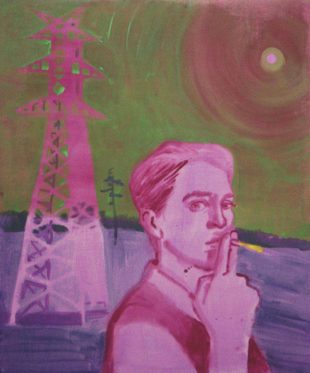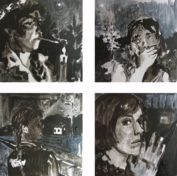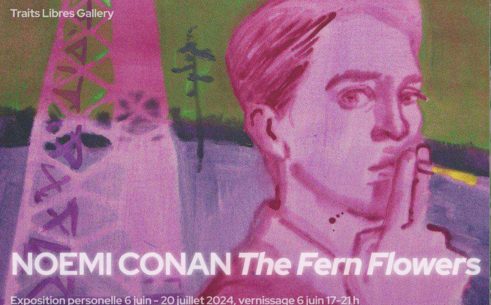Entering Noemi Conan’s exhibition is to be enveloped in a narrative, her narrative. Female figures, including self-portraits, are omnipresent in the gallery, painted in acrylic and watercolor, capturing moments from varied perspectives. These figures form a timeless and placeless community, interwoven with Conan’s personal history.
Hints of her past are scattered throughout: pine trees, a Fiat 125 P (her grandparents’ car), cigarettes, houses, and an electrical pylon. These elements are cinematic, reconstructing her childhood environment to explore her identity. The exhibition reflects the resilience of women like her mother and aunts, who raised children single-handedly in Eastern Europe’s post-socialist era. Conan portrays her mother as a “Polish mother,” a builder of her youth, embodying education, morality, and sacrifice.
The relics of noble ancestry carried by her grandparents contrast with their working-class reality. Conan’s work honors these women and seeks her identity, rebuilding her socio-cultural belonging with each painting. The challenge of identifying her cultural roots stems from multi-generational migrations and historical upheavals in Eastern and Central Europe.
Her memories of the 1980s-90s blend glorified and discarded fragments, forming a community of women to understand her identities. This homage aligns with the daily struggles of every woman and mother seeking recognition. Her work echoes the writings and activism of Silvia Federici, co-founder of the “International Wages for Housework Campaign,” highlighting the socio-political value of domestic labor.
Conan’s fascination with small jobs reflects a quest for social inclusion despite political neglect. She nostalgically recreates the social connector of cigarette breaks. Her vivid colors bring intensity to scenes, inserting self-portraits that sometimes split, evoking a dysfunctional identity and creating an atmospheric tension. Contrasting black-and-white watercolors punctuate the collection, perhaps as nostalgic flashbacks.
Noemi Conan’s autobiographical approach intertwines with the women around her, offering a collective and impersonal dimension that resonates with our own stories and current socio-political contexts, akin to Annie Ernaux’s writing. As June 20 approaches, we hope to find these fern flowers to bring us luck.
Fabienne Bideaud, Art Critic and Exhibition Curator





